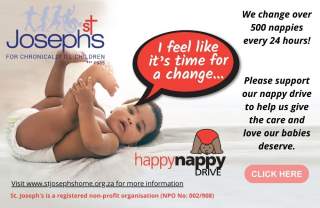Changing 500 nappies a day? That’s THE normal at St Joseph’s!
St Joseph’s annual Happy Nappy Drive is underway
Changing 500 nappies a day may sound like an impossible task to most people but this daily marathon of providing sanitary hygiene to medically fragile children is par for the course for the staff at St Joseph’s in Cape Town. This well-loved institution provides intermediate, facility-based care for children with chronic or life-limiting conditions.
For the past 85 years, this beacon in paediatric care in Southern Africa has been providing expert and hands-on nursing and rehabilitation for over 23 000 children from vulnerable communities.
Their annual Happy Nappy Drive is underway and emphasises the tremendous needs of St Joseph’s in the practical aspects of looking after and taking care of medically fragile children.
“On average children with life-threatening conditions stay for six months, receiving holistic and multi-disciplinary medical treatment free of charge,” says Christa Robijn, St Joseph’s resource development manager.
She adds: “Every 24 hours we use more than 500 nappies and our annual nappy bill is more than R500,000. The Happy Nappy Drive is vital to meeting our children’s needs and our goal this year is to raise R250,000 and collect over 50,000 nappies.”
Disposable nappies
As St Joseph’s treats children with life limiting and life-threatening illnesses it uses disposable diapers as it has been proven that disposable diapers are effective in decreasing probable sepsis in neonates.
“Using disposable diapers also decreases the number of diapers used per day,” Christa explains, “and also the number of times a nurse comes into contact with a baby, especially during these COVID-19 times. Operationally, our in-house laundry also has limited capacity. Of course, we care about the environment, but we also care about a high standard of critical medical care and disposable items are needed to achieve this.”
Not considered medical
As nappies are not considered medical consumables by the Department of Health, this puts an extra financial burden on parents in the vulnerable communities, especially parents of chronically ill children.
Says Christa: “As a non-profit organisation, St Joseph’s runs a 175-bed facility and we rely on donations from organisations and individuals to enable us to provide the best quality care for our children. We fundraise all year round through various initiatives like our Happy Nappy Drive.”
There are various ways to join the Happy Nappy Drive:
- Donate safely and quickly on St. Joseph’s website:
https://stjosephshome.org.za/donate/happy-nappy-drive/ A pack of nappies is about R260, but there is no minimum amount - every little bit helps!
- Alternatively, nappies can be ordered online at Clicks, Dischem or Pick n Pay and delivered to Joseph’s, 40 Pallitti Rd, Montana, 7490, Cape Town.
For lots more info on the Happy Nappy Drive and St Joseph’s, go to: https://stjosephshome.org.za
Contact:
Christa Robijn
Resource development manager, St Joseph’s Home for Chronically Ill Children
Tel. +27 21 934 0352
Email: This email address is being protected from spambots. You need JavaScript enabled to view it.
Remembering the children
World AIDS Day will be celebrated this Thursday, 1 December 2016. UNAIDS has declared the theme ‘Hands up for #HIVprevention’ in response to the results of the Prevention Gap Report which shows high levels of new HIV infections every year.
At the end of 2015, there were approximately 2.6 million children living with HIV around the world. Factors such as discrimination, poverty, inequality, and harsh policies and laws prevent these children from receiving the necessary testing, healthcare, life-saving commodities and support to remain HIV free. Children’s palliative care is an often forgotten component of care for these children.
Children’s palliative care is holistic care that responds to the physical, emotional, social and spiritual needs of a child infected with HIV as well as providing care for the child’s family. It aims to provide expert pain relief and symptom control and whatever emotional, social and spiritual support is required to enable the affected child to enjoy the best quality of life for as long as possible.
In response to the theme ‘Hands up for #HIVprevention’, the International Children’s Palliative Care Network (ICPCN) urges people to remember the children infected and affected by HIV & AIDS and the role of children’s palliative care. Asked to comment, ICPCN’s Chief Executive, Professor Julia Downing, said, “The provision of quality palliative care for children with HIV is essential and should be an important part of the continuum of care for children with HIV. Yet access to palliative care for children in many countries is limited, hence on this World AIDS Day it is important to focus not only on prevention as per the theme ‘Hands up for #HIVPREVENTION’ but also on the provision of care to all those children already infected – we need to ensure that all children who need it, regardless of where they live, have access to palliative care.”



